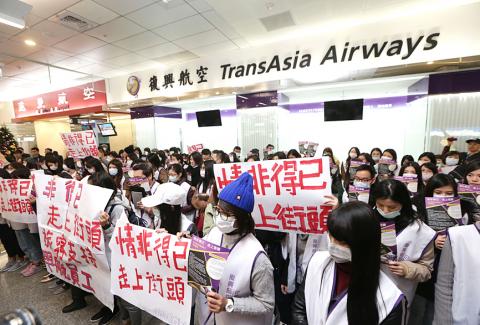Regional Taiwanese airline Far Eastern Air Transport Corp (遠東航空) yesterday confirmed its interest in taking over and restructuring TransAsia Airways Corp (復興航空), which abruptly announced its closure last month due to financial problems.
Far Eastern has been in negotiations with TransAsia’s creditor banks to have its takeover plan approved and the banks are expected to meet next week to discuss the bid.
If Far Eastern is to restructure TransAsia, the consortium of creditors must agree to the airline’s proposal and then ask the court to designate Far Eastern as the company that will restructure TransAsia.

Photo: CNA
Far Eastern chief operating officer Tseng Chin-chih (曾金池) said he was optimistic about the banks’ decision, adding that the company would have to raise NT$2 billion (US$62.56 million) in capital and get the rest from bank loans for the deal.
Future operations would be run as a two-company joint venture, with TransAsia being renamed Far Eastern United Airlines, Tseng said, adding that, despite a downscaling, Far Eastern expects to retain about 1,000 former TransAsia employees.
Far Eastern had not considered a merger with TransAsia because TransAsia holds an Air Operator Certificate (AOC) that would unnecessarily drag out the process of a merger, Tseng said.
“Under this structure, we hope to resume domestic flights in the shortest possible time,” Tseng said, adding that because of the AOC, the new airline could retain services, such as maintenance, standing in as ground crew for other airlines and a catering service.
As air traffic rights held by TransAsia were rescinded by the Civil Aeronautics Administration, Tseng said Far Eastern hopes to negotiate with the agency for all the routes formerly operated by TransAsia.
Domestic routes would be prioritized should the takeover be successful, Tseng said.
In terms of wages, Tseng said airlines have different standards, and capability and experience would be a priority when considering former TransAsia employees.
TransAsia spokesperson Liu Chung-chi (劉忠繼) declined to comment on the issue.
The administration yesterday said it respected Far Eastern’s bid to restructure the airline, but said that it would continue to reassign TransAsia’s flight routes as scheduled, adding that other carriers were now coordinating the flight routes.
Additional reporting by Chen Min-wei

A magnitude 7.0 earthquake struck off Yilan at 11:05pm yesterday, the Central Weather Administration (CWA) said. The epicenter was located at sea, about 32.3km east of Yilan County Hall, at a depth of 72.8km, CWA data showed There were no immediate reports of damage. The intensity of the quake, which gauges the actual effect of a seismic event, measured 4 in Yilan County area on Taiwan’s seven-tier intensity scale, the data showed. It measured 4 in other parts of eastern, northern and central Taiwan as well as Tainan, and 3 in Kaohsiung and Pingtung County, and 2 in Lienchiang and Penghu counties and 1

FOREIGN INTERFERENCE: Beijing would likely intensify public opinion warfare in next year’s local elections to prevent Lai from getting re-elected, the ‘Yomiuri Shimbun’ said Internal documents from a Chinese artificial intelligence (AI) company indicated that China has been using the technology to intervene in foreign elections, including propaganda targeting Taiwan’s local elections next year and presidential elections in 2028, a Japanese newspaper reported yesterday. The Institute of National Security of Vanderbilt University obtained nearly 400 pages of documents from GoLaxy, a company with ties to the Chinese government, and found evidence that it had apparently deployed sophisticated, AI-driven propaganda campaigns in Hong Kong and Taiwan to shape public opinion, the Yomiuri Shimbun reported. GoLaxy provides insights, situation analysis and public opinion-shaping technology by conducting network surveillance

‘POLITICAL GAME’: DPP lawmakers said the motion would not meet the legislative threshold needed, and accused the KMT and the TPP of trivializing the Constitution The Legislative Yuan yesterday approved a motion to initiate impeachment proceedings against President William Lai (賴清德), saying he had undermined Taiwan’s constitutional order and democracy. The motion was approved 61-50 by lawmakers from the main opposition Chinese Nationalist Party (KMT) and the smaller Taiwan People’s Party (TPP), who together hold a legislative majority. Under the motion, a roll call vote for impeachment would be held on May 19 next year, after various hearings are held and Lai is given the chance to defend himself. The move came after Lai on Monday last week did not promulgate an amendment passed by the legislature that

Taiwan is gearing up to celebrate the New Year at events across the country, headlined by the annual countdown and Taipei 101 fireworks display at midnight. Many of the events are to be livesteamed online. See below for lineups and links: Taipei Taipei’s New Year’s Party 2026 is to begin at 7pm and run until 1am, with the theme “Sailing to the Future.” South Korean girl group KARA is headlining the concert at Taipei City Hall Plaza, with additional performances by Amber An (安心亞), Nick Chou (周湯豪), hip-hop trio Nine One One (玖壹壹), Bii (畢書盡), girl group Genblue (幻藍小熊) and more. The festivities are to